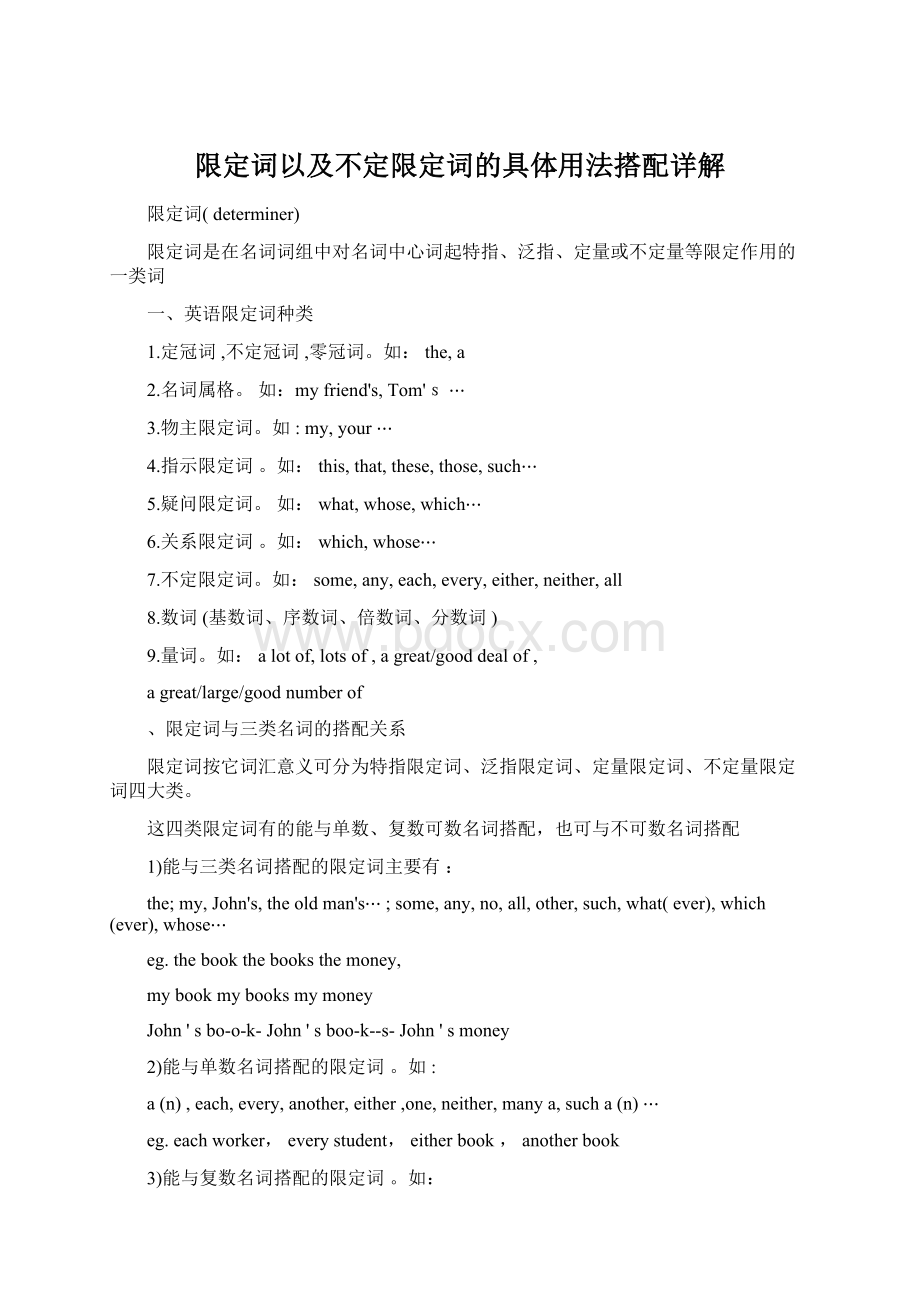限定词以及不定限定词的具体用法搭配详解.docx
《限定词以及不定限定词的具体用法搭配详解.docx》由会员分享,可在线阅读,更多相关《限定词以及不定限定词的具体用法搭配详解.docx(12页珍藏版)》请在冰豆网上搜索。

限定词以及不定限定词的具体用法搭配详解
限定词(determiner)
限定词是在名词词组中对名词中心词起特指、泛指、定量或不定量等限定作用的一类词
一、英语限定词种类
1.定冠词,不定冠词,零冠词。
如:
the,a
2.名词属格。
如:
myfriend's,Tom's⋯
3.物主限定词。
如:
my,your⋯
4.指示限定词。
如:
this,that,these,those,such⋯
5.疑问限定词。
如:
what,whose,which⋯
6.关系限定词。
如:
which,whose⋯
7.不定限定词。
如:
some,any,each,every,either,neither,all
8.数词(基数词、序数词、倍数词、分数词)
9.量词。
如:
alotof,lotsof,agreat/gooddealof,
agreat/large/goodnumberof
、限定词与三类名词的搭配关系
限定词按它词汇意义可分为特指限定词、泛指限定词、定量限定词、不定量限定词四大类。
这四类限定词有的能与单数、复数可数名词搭配,也可与不可数名词搭配
1)能与三类名词搭配的限定词主要有:
the;my,John's,theoldman's⋯;some,any,no,all,other,such,what(ever),which(ever),whose⋯
eg.thebookthebooksthemoney,
mybookmybooksmymoney
John'sbo-o-k-John'sboo-k--s-John'smoney
2)能与单数名词搭配的限定词。
如:
a(n),each,every,another,either,one,neither,manya,sucha(n)⋯
eg.eachworker,everystudent,eitherbook,anotherbook
3)能与复数名词搭配的限定词。
如:
both,two,anothertwo(three),many(,a)few,several,these,those,a(great)numberof⋯如:
twogirls,(a)fewwords,severalstudents
4)能与不可数名词搭配的限定词,如:
abitof,alargeamountof,agreatdealof,(a)littlemuch,less,(the)least⋯
abitofwater,alargeamountofmoney,muchnoise
5)能与单复数名词搭配的限定词。
如:
thefirst,thesecond,thelast,thenext,theother⋯
thefirstrose,thefirstroses,thelastman,thelastmen
thenextmeeting,thenextmeetings,manyaship,manyships⋯
注意:
用了manya+单数可数名词作主语,尽管是复数意义,其后的动词还是要用单数形式。
6)能与单数名词和不可数名词搭配的限定词。
如(the)least,this,that⋯
theleastknowledge,this/thatwork,this/thatjob
7)能与复数名词和不可数名词搭配的限定词。
如:
alotof,lotsof,plentyof,enough,more,most,such,other⋯.如:
alotofbooks,alotofmoney,lotsofchairs,lotsoffood,suchmen,suchbread⋯
Ex:
下面的练习,要求注意限定词与三类名词的搭配关系。
1.
Why
isthere
___traffic
onthestreets
inFebruary
thaninMay?
A.
less
B.
fewer
C.few
D.little
2.
On
account
of
the
typhoonshipmentwill
arrive
thisweek.
A.
neither
B.all
C.bothD
.these
3.
They
paid___
money
forthemachine
thanIexpected.
A.
little
B.
lessC.much
D.fewer
4.There
aretreeson___sideofthestreet.
A.
sucha
B.bothC.some
D.each
5.Have
you
got__
copiestogo
round?
A.
theotherB.enough
C.
alittle
D.much
6.Isaw___
carsoutsidethebuilding
A.
alittle
B.anyC.lots
ofD.
neither
7.There
's_
___waterin
thebottle.
A.
fewB.
anumberof
C.plentyof
D.any
8.I'dlike__
__paper.
A.
afew
B.several
C.a
bitof
D.these
9.There
are
___mistakesinthepaper.
A.theB.a
littleC.much
D
afew
10.Do
they
have
air-conditioners
for
cooling
therooms
insummer?
theroom.
___workhas
tobe
done
beforetheplantgoes
into
operation
A.MuchB.
Double
C.AnumberofD.
Neither
14.Hewrote___
essays
onVictoriannovelsinhis
class.
A.the
next
B.the
mostC.theotherD.
themore
15.Themodel
worker
had_
__thoughtofhisown
interests.
A.the
last
B.less
C.theleastD.another
16.Theremust
be__
empty
talkbutmorehardwork.
A.fewer
B.no
C.theleastD.less
17.Hehaspublished_
___shortstoriesinEnglish.
A.agreat
amountof
B.anumberof
C.another
D.manya
18.Wehad___rainfalls
last
summer.
B.agreatdealof
C.lessD.alotof
A.much
A.toomuchB.littleC.alittleD.onlyseveral
、限定词与限定词之间的先后顺序关系
在名词词组中心词之前如果有两个或两个以上限定词出现时,就会产生限定词的先后顺序
问题。
按其不同的搭配位置,限定词可分为
前位限定词:
all,both,half;double,twice,threetimes;one-third,twofifths;what,such(a/an)⋯
中位限定词:
(1)定冠词和不定冠词;
(2)物主限定词(my,your⋯
(3)指示限定词(this,that,these,those);
(4)'s属格名词;
(5)不定数量词(如some,enough,no,any,every,each,either,neither);
(6)疑问限定词what,which,whose;
(7)关系限定词which,whose;
(8)带ever的wh-词,如whatever,whichever,whoever。
后位限定词
(1):
(1)基数词;
(2)序数词和一般序数词next,last,(an)other,additional,further;
(3)封闭数量词(a)few,fewer,several,most,more,many,much,(a)little,less,least;
后位限定词
(2):
plentyof,abitof,alotof,lotsof,agreatdeal/quantity/amount/numberof⋯
如果一个名词词组带有上述三类限定词,其搭配关系总是
按照
“前位
—中位—后位”的顺序排列。
如
all
the
four
teachers
前
中
后
all
your
three
books
前
中
后
all
these
last
fewdays
前
中
后
后
如果只有上述两类限定词,其搭配关系仍按照上述顺序
half
his
lecture
前
中
thoselast
fewmonths
中
后
后
all
other
students
前
后
such
amisfortune
前
中
somesuch
alloy
中
后
ADHERE
such既属于前位限定词,又可归纳后位限定词。
在sucha⋯和suchan⋯搭配中属于前位限定词,而在与其他限定词some,any,no,all,one,many等搭配时,such则是后位限定词。
由上述例子可以看出,中位限定词之间和前位限定词之间是互相排斥的,即一个名词中心词之前不可并用两个中位限定词或两个前位限定词。
所以“我的那本书”不是“mythatbook”
而是thatbookofmine,因为my和that同是中位限定词,不可同时并列。
但后位限定词的使用却不受此限制。
如:
manymorecopies,threeothergirls,hislasttwobooks,thefirsttwochapters等都是后位限定词重叠使用的实例。
Ex.Chooseanappropriatecombinationofdeterminerstofillineachblack:
Theadditionalworkwilltakeweeks.
A.theotherB.anotherfiveC.otherfiveD.themoreHediditin___timeittookme.
A.theone-thirdB.halfaC.thedoubleD.one-thirdthe
Isaw___boysatthecinema.
A.thebothB.manyaC.boththeD.theseveral___candidatesaregirls.
A.HalftheB.ThehalfC.TheirhalfD.Halfa
5.Hewasonleave___days.
A.thefewlastB.fewanotherC.fewotherD.thelastfew
6.___friendsusuallyspeakhighlyofhim.
C.ThefirstsomeD.Somethefirst
四.疑问限定词
无论是做疑问代词还是疑问限定词,which(哪个,哪些)和what所指的范围不同。
what所指的范围是无限的,而which则指在一定的范围内,例如:
1.Whichgirlsdoyoulikebest?
你喜欢哪几个姑娘?
2.Whatgirlsdoyoulikebest?
你喜欢什么样的姑娘?
3.Whichuniversitydoyoulikebest?
4.Whatuniversitydoyoulikebest?
五.关系限定词
关系代词whose既充当引导词的作用,又对先行词起限定作用,在定语从句中作先行词的定语。
childwhoseparentsaredeadiscalledanorphan.
六.不定代词
不定代词及其基本用法
1.all,each,both,either,neither,some,any,one,(a)little,(a)few,many,much,other(s),another,主语,宾语,表语,定语(既可用作名词,也可用作形容词)
2.everyone,everybody,everything;somebody,someone,something;anyone,anybody,anything;nobody,nothing,noone主语,宾语,表语,可以后跟else,而且可用作所有格(-'s形式)
3.none主语、宾语,表语
4.every,no(这两个只是形容词)定语
不定限定词与各类名词的搭配
all,each,both,either,neither,some,any,
one,(a)little,(a)few,many,much,other(s),another,
1.只与复数可敉名词搭配的不定限定词
both,many,(a)few
2.只与不可敉名词搭配的不定限定词
much,(a)little
3.只与单数可敉名词搭配的不定限定词
each(every,one),either,neither,manya,
4.既可与复数可敉名词,又可与不可敉名词搭配的不定限定词other,another,
all,some,any,many,
不定限定词的具体用法
some和any既可用作限定词,也可用作不定代词,起名词词组的作用;但no只能用作限定词不能单独使用。
1)some
a.some主要用于肯定句。
但当说话人期待肯定回答时,
some也能用于疑问句。
Aretheresomelettersforme?
I'mexpectingsome.
b.当购物时向售货员提问或主人询问客人表示款待时,也可
在疑问句中用some。
CouldIhavesomelettersformeWouldyoulikesomechocolatecake?
c.当some与单数可数名词连用时,相当于acertain某
(一)个”的意思。
Someboyhasbrokenawindow
d.当some修饰复数可数名词或不可数名词,表“几个”,“一些”的意思。
如somequestions,somechildren,somewater,someink
2)any
a.any主要用于否定句、疑问句、条件句、if或whether引导的宾语从句,或用于带有半否
定词或具有否定含义的动词、形容词或介词的句子。
如:
1.Aretheyanystampsinthedrawer?
2.Youhaven'tanyworktodo
3.Heneverhadanyluck
4.Letmeknowifyouhearanynews
5.Ifyouhaveanynews,callmeuprightaway.
b.any也用于肯定句,意味“任何”。
通常重读,修饰单数可可数名词和不可数名词。
如:
1.Comeanydayyoulike.
2.Anytimeyouwantme,justsendforme.
c.any+复数可数名词/不可数名词,表“一些”
anybooks,anywater
d.any+单数可数名词,表示“every”的含义
Anychildcouldanswerthatquestion.
3)no可修饰单复数可数名词和不可数名词。
用法如下:
a)
any
用于thereis(are),have(has),have(has)got之后,等于not1.Therearenolettersforyoutoday.
2.HehasnobooksI'vgotnohome.
b)用于连系动词之后,等于nota,但语气很强.
1.Thegirlwasnobeauty.
2.Heisnofriendofmine.
c)用于其他动词之后
1.Itooknopartinthesenegotiations.
2.HecouldexpectnosympathyfromJoan.
d)用于修饰其他句子成分
1.Noboyatschoolhadeverseenthesea.
2.I'minnomoodforjokes.
e)用于警告、命令等标识
Nosmoking!
f)用于表示程度,notany,用作状语,修饰形容词原级、
比较级和副词比较级
1.Butthisisnounimportantquestion,mydearJohn
2.ShewasnoolderthanLiPing.
g)用于固定习语
1.Menarenolongeratthemercyofnature.
2.There'nsosuchthingasghosts.
not与no的区别:
a)not可用于否定动词,no则没有这种功能。
b)no是具有形容词性质的不定代词,只能与名词或相当于名词的词连用,如notime,notelephone,Nospitting!
c)no等于notany,因此不能用于a,the,all,both,
every等词之前;在这些词之前必修用not,如notachance,nottheleast,notallofus,noteveryone,notenough。
d)no也不与姓名、副词、介词等连用。
但not可与这些词连用,如me,notGeorge;notwisely;notonSundays.
e)some,any,no以及它们的合成词。
这些复合词作主语时,谓语动词用单数形式。
something(-body,-one,-where)anything(-body,-one,-where)nothing(-body,-where),后者不是限定词
all,both,none,noone,neither,either,every,each
1)all“全体”的意思。
Both:
俩
1.Allstudentswenttotheclassroom.
2.Bothhisparentsareteachers.
2)none如果要表示“全体都不”的意思,就用none(指“物或人”,
三个以上)。
none后常跟of短语,作主语时谓语动词可用单数或复数。
可作主语、宾语、表语、同位语等。
1.Noneofthedogswas(were)there.
2.Noneofthemoneywaseverrecovered.
3)noone=nobody
noone只指人,不指物,作主语时,谓语用单数。
跟none有相同之处。
如:
Noonewashere.
4)neither
如果要表示两个人或物“都不”,通常要用neither。
可作主语、宾语、定语。
作主语时.
谓语用单数可跟of短语。
1.Neitherofmyfriendshascomeyet.
2.Neitherbrotherhasbeenabroad.
5)either
跟neither意义相反,意思是“两者之中任何一个”,在句子中作主语、宾语,表示单数概念,作主语时谓语动词须用单数形式。
1.Eitheroftheplansisequallydangerous.
2.Thenewsdidnotshockeitherofthem.
6)every表示全体中的“每个”,如果这个“全体”包含三个或更多的人或物,通常用every,与单数名词连用。
1.Everystudentintheclasstookpartintheperformance
2.EverytimeIringyouup,Ifindyouengaged.
7)each两个或两个以上的人或物就用each。
与单数可数名词和单数动词连用
1.Eachsideofthestreetwascrowdedwithpeople.
2.Each/Everysideofthesquarewascrowdedwithpeople.